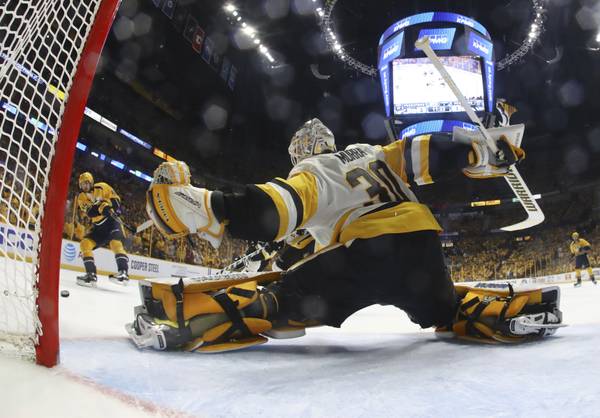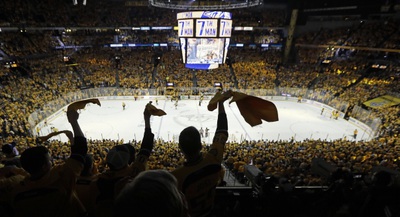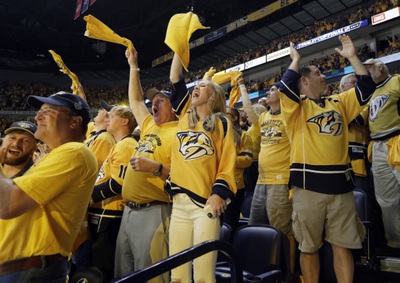Related news
Imagine this uniquely Vegas sports scene: top-shelf musical acts rock out on a stage jutted from the stands between periods of an NHL game while tanned celebrities in comped luxury suites sip free cocktails.
That would be NashVegas, by the way.
Nashville — call it NashVegas or Smashville if you like, as some local fans do — hosts hockey’s most raucous parties these days. Country superstars Carrie Underwood and Martina McBride belt out the national anthem while Tim McGraw croons his specially tweaked version of “I Like It, I Love It” on the video board for every Predators goal. Tennessee Titans players wave the ceremonial yellow rally towel to whip up a crowd that needs little whipping, what with its penchant for throwing catfish on the ice while creating the loudest atmosphere in the league.
Far from a hockey hotbed before the Predators arrived in 1998, Nashville endured typically dark expansion years and a change in ownership before embracing local identity to become the NHL’s poster child for growing its game outside America’s Snowbelt regions. The Vegas Golden Knights, also citizens of an unlikely hockey city powered by celebrity wattage and entertainment overload, strive to emulate the Nashville model as they build Nevada’s first major pro sports franchise.
“The Nashville-type euphoria that is happening now that they’re in the finals, there’s no reason that can’t happen here,” said Nehme Abouzeid, the Vegas Golden Knights senior vice president and chief marketing officer.
Building that excitement in Las Vegas with an expansion team likely to struggle in its initial seasons requires the Golden Knights to create buzz within and beyond the game.
“It’s about putting a good entertainment experience on the ice. We’re competing with shows, we’re competing with other attractions — that’s how I’m looking at it. We’re the latest headliner on the Strip,” Abouzeid, a longtime casino executive with Wynn and Sands, said. “We don’t have a 90-year history like the (Boston) Bruins, where you just kind of rely on those core hockey fans. We feel like every night is a tryout for us and we’ve got to sell it out, and we’ve got to work hard to do it.”
Such local interest naturally trails success. The Predators drew 17,160 fans per game in 2016-17, the franchise’s 10th playoff season in the past 13 years. Nashville and 14 other NHL teams averaged a sellout crowd, but the team joined Los Angeles and Tampa Bay as the only teams outside traditional hockey markets in Canada, the Northeast and Great Lakes to do so.
Tickets for Sunday’s Game 6 of the Stanley Cup Finals at Bridgestone Arena begin at $1,900 on Stubhub. More than 50,000 people gathered in the streets of Nashville during Game 3 to cheer on the Predators after taking in a free concert by Alan Jackson. Even the Jerry Tarkanian era, UNLV's finest, did not match that engagement.
“Human nature is that people want to be a part of something and that’s really what happens when you see what’s going on in Nashville right now,” said D.J. Allen, a former senior associate director overseeing sports marketing at UNLV.
Predators games did not always bring together a Nashville community weaned on University of Tennessee football. The team drew more than 16,000 fans per game in both of its initial two years, but posted losing records in each of its first five seasons. Attendance fell sharply as Nashville scuffled from its second to its sixth season, reaching a low mark of 13,157 fans per game and just 6,200 season tickets sold in 2003-04.
The NHL suffered through a lockout the next year and the Predators were sold after the 2006-07 season following consecutive fourth-place finishes in the Western Conference. In fact, Nashville made the playoffs seven out of eight years from 2003-04 to 2011-12, establishing a winning tradition and creating an exciting atmosphere that local celebrities wanted to join.
The allure of winning, though, only accounts for part of the attraction, Allen said.
“Great sports marketing doesn’t change a whole lot based on whether (the team is) going to be great or not,” Allen said. “You have to be consistent. You have to promote that it’s the place to be in town. You need people to think, I can’t miss the game because it’s going to be exciting just to be in the arena. I don’t want to miss out on the opportunity of seeing somebody or being seen.”
That means bringing in celebrities, whether country stars in Nashville or Strip headliners in Las Vegas.
“If the local stars are there supporting the team, the fan base might come out and support the team,” said Patrick Walsh, an assistant professor of sport management at Syracuse University. “It becomes a see-and-be-seen thing, and more than a hockey game.”
Abouzeid plans to cash in on the constant rotation of stars who come to Las Vegas throughout the year.
“We want to be very celebrity-friendly, obviously,” Abouzeid said. “We want to leverage the entertainment corridor on the Strip.”
Allen used that strategy to help UNLV basketball’s resurgence as a community event during Lon Kruger’s tenure as head coach in the middle of the last decade. The “Lights Please” videos from the 2009-10 season used celebrities including Holly Madison, Jimmy Kimmel, Kenny Mayne and Robin Leach to fire up fans during introductions. Gucci Row, the courtside seats at the Thomas & Mack Center, began filling up with stars again as well.
“It becomes really a natural fit because it’s part of who we are,” Allen said. “Even within the last decade, you saw UNLV basketball, when it was having success, was really trying to tap into that. You’re even seeing some of that with UNLV football right now.”
Abouzeid’s team is studying Nashville, as well as San Jose, Tampa Bay and Anaheim, for ideas on how to thrive in non-traditional hockey markets. As much as the Golden Knights want to create their own culture — Abouzeid mentioned potential ideas including team chants and marching into the stadium like Major League Soccer teams do — they also respect the need for fans to embrace their own ideas.
“A lot of this has to be organic, too,” Abouzeid said. “The catfish (in Nashville), the octopus in Detroit, those were all organic things. We can’t just manufacture it.”
“Vegas has a lot of history to play on, a lot of heritage, whether it’s jingling slot machines, whether it’s the sound of an imploding hotel. It could be a jet fighter that takes off from Nellis Air Force Base. There’s a lot of sound elements that are native to Las Vegas. There’s a lot of entertainment elements and things. Years ago, you would have envisioned the Rat Pack. Nowadays, people envision DJs.”
“Certainly there will be some uniquely Vegas elements in our game presentation and our overall marketing experience. We don’t want to have a team where you could pick up the team and drop it in any city.”
Allen sees that as key to growing a local hockey culture with a history of respectable support for the minor-league Las Vegas Thunder and Las Vegas Wranglers franchises.
“What’s great about a market like Nashville is when you can celebrate your uniqueness,” Allen said. “Nashville can do it and Las Vegas is positioned to do the same thing.”
The Golden Knights sold 13,000 season tickets before halting sales in April. The team continues to sell partial-season plans and will announce plans for single-game tickets later this summer. Abouzeid cited backing from locals as a main reason he left his position on the Strip to join the franchise.
“Once I really found that those season-ticket holders (had) ZIP codes (that) were local, then I realized that it was really strong local, independent demand,” Abouzeid said. “It wasn’t corporations propping up the tickets. It was families buying two, four, six tickets. That’s real demand. That’s real support.”
Abouzeid’s group holds meetings in which they go through what he describes as the 8-10 things that are critical on game day, including the national anthem, goal horn, ice crew, and dance team. They discuss whether that element should be traditional or modern, or they should throw out the rule book entirely.
“For me,” Abouzeid said, “it’s a matter of putting on a show in a showbiz town.”




Join the Discussion:
Check this out for a full explanation of our conversion to the LiveFyre commenting system and instructions on how to sign up for an account.
Full comments policy